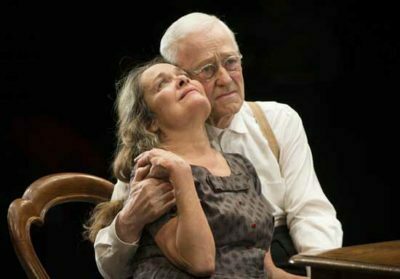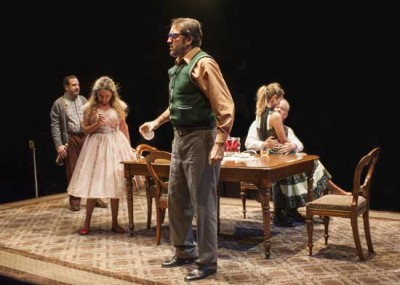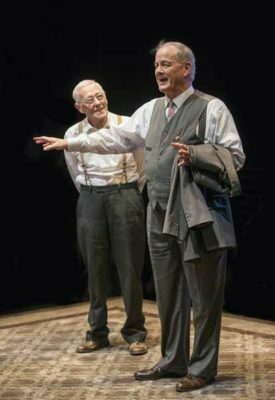The Birthday Party

Directed by Austin Pendleton
Starring Ian Barford, Marc Grapey, Francis Guinan,
Moira Harris, John Mahoney & Sophia Sinise
At the Steppenwolf Theater Company, Chicago
Steppenwolf’s cast of veteran pros invite you to an evening of carnivalesque mayhem…
I had a somewhat prescient experience while on my way to the theater. Hopping aboard the Howard-bound Red Line, I became aware that the man sitting alone in the middle of the car was talking to himself. And not, mind you, the sort of mutterings we catch our embarrassed friends and neighbors engaged in when they think nobody is around. No, they were ramblings of the indistinct variety, punctuated by outbursts of insane laughter or violent shouting. With a face that oscillated from a calm familiarity to fearful panic, the man gestured wildly in the air, his crystalline gaze held by faces not there. And as the train grew more crowded with each subsequent stop—Roosevelt, Grand, Chicago—its passengers had to find more and more creative ways to shut him out. Something suddenly urgent on the iPhone. That joke we just needed to tell our friends one more time. A mindless fumbling around in the shopping bag. Something very bad was happening to that man in the middle of the car. Yet somehow we convinced ourselves that we were the helpless ones.
Let’s just say then that there was something reminiscent in this production of Harold Pinter’s The Birthday Party, produced by the Steppenwolf Theater Company. The boxcar-like stage. The parallel rows of spectators. The crazy man in the middle, railing against some unperceived horrors, unable to be saved or helped. The play is set in a rundown boarding house, run by Meg and Petey Boles, in some unspecified little English town adjacent to the sea. Stanley Webber, the Boles’ tenant for the past year and a proverbial “washout,” is even at the play’s outset a rudderless boat. But things are about to change for Stanley when two strange men show up to the house looking for board. And, it would appear, looking for Stanley.
Director Austin Pendleton and scenic designer Walt Spangler have chosen to flank the stage on either side with the audience. Distracting as it may be for some, we are nonetheless given the eerie experience of watching ourselves watch Stanley fall to pieces and are thus implicated in Meg’s and Lulu’s and even Petey’s own inability to intervene. The cold, blank, even somber faces of the audience become a kind of silent Greek chorus, watching from a safe distance as Stanley’s tragic isolation explodes across the stage. And Spangler’s use of a single dining room table serves well to anchor the action of the play. Like a black hole or an oasis in the desert, it draws the actors in, forcing them to interact with one another. It stands alone as the play’s one unassailable fact.
Just as well. This veteran troupe of Chicago’s finest don’t require much to lean on. The impressive Ian Barford never shies away from the fact that Stanley is a near total reprobate, so how he is able to summon the immense empathy he does is as close as I’ve seen to total magic in a long time. And Moira Harris’s portrayal of Meg Boles is so disarming and irresistible that we are inclined to forgive Meg for all her self-imposed blindness. Marc Grapey and Francis Guinan, as the strangers McCann and Goldberg, are equally pitch-perfect, each shifting so seamlessly between knockabout clown and rogue villain that we laugh even when we are most disturbed. Rounding out this magnificent cast is the venerable John Mahoney as the stalwart proprietor Petey, along with Sophia Sinise (daughter of Steppenwolf founder Gary Sinise) whose turn as Lulu is both poised and surprisingly no-nonsense.
Pendleton’s experiences directing Chekhov serve him well here. Birthday Party isn’t a Tarantino movie, after all, and its violence should be menacing but never explicit. Put too much emphasis on the force brutality, and it degenerates into sadism. Thankfully, Pendleton knows how to shift focus to the non-action of the play: its deflections, its ellipses, its repressions, its ambiguities. He challenges his audience to see beneath the veneer of overt action and to ask instead “What isn’t happening? What isn’t being said? What isn’t being properly addressed?” The birthday party itself, for example, is a subtle piece of choreography, its outward reveries of toasts and party games striking just the right discordant tone to Stanley’s silent and near total internal collapse.
The arch-literary critic, Harold Bloom, once wrote that Pinter’s art “has some undefined but palpable relation to the Holocaust, inevitable for a sensitive dramatist, a third of whose people were murdered by the time he was fifteen.” But to interpret Pinter through the lens of political and historical allegories only excuses us from what is the Birthday Party’s true subject: the everyday horrors we choose to ignore and the people closest to us we are unwilling (unable?) to save.
If Pinter teaches us anything, it’s that we’ll do just about anything to think ourselves the helpless ones.
HIGHLY RECOMMENDED
Anthony J. Mangini
Date Reviewed: February 5, 2013
Running time is around 2.5 hours. There are two 10-minute intermissions. The Birthday Party is at Steppenwolf Theater (1650 N. Halsted Ave.) until April 28th, 2013. Tickets can be obtained either at the theater’s website (https://www.steppenwolf.org//) or at www.theaterinchicago.



